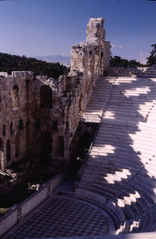Archaeology Reading Group 2015

Athens (Photograph: Andrew Stephenson)
30 April
Venue: Graduate Seminar Room a (Room 210), 1st floor, Old Arts
Time: 6:00
Chair: Giorgi Bedianashvili (Georgian National Museum)
Are Changes in the Global Economy Connected to Changes in the Global Power Balance?
The discussion will focus on the transitional period from the Late Bronze Age to Iron Age in the Caucasus, Near East and Mediterranean regions. We will consider how the introduction of iron changed existing rules, causing the collapse and fragmentation of societies monopolising the main elements for bronze production.
Reading:
Mikheil Abramishvili, in press ‘Tin and oil. Can we foresee the future through remote past?’ 4th Eurasian Archaeology Conference opening lecture. Forthcoming in A. Smith, K. O’Neil Weber and E. Hite (eds), Fitful Histories and Unruly Publics.
Additional reading:
Susan Sherratt 2003: ‘The Mediterranean economy: “Globalisation” at the end of the second millennium B.C.E.’, in W. G. Dever and S. Gitin (eds), Symbiosis, Symbolism, and the Power of the Past: Canaan, el, and their Neighbours from the Late Bronze Age through Roman Palaestina, 37-62. Eisenbrauns: Indiana.
28 May
Venue: Graduate Seminar Room a (Room 210), 1st floor, Old Arts
Time: 6:00
Chair: Jarrad Paul
Looking from the Outside In: Historical Perspectives from Ancient to Modern
The focus of this session is to examine the usefulness of outside perspectives in reconstructing past societies. What roles do neighbouring nations play in researching each other’s past?
The first article investigates Neolithic Anatolian history through a European lens, as the author primarily works on Greek prehistory. The article addresses numerous topics from conflicting chronologies to the spread of early farmers from Anatolia to Europe. The second article takes a historical approach with the author viewing the past through modern historical textbooks in Greece and Turkey. This article aims to investigate what each country is including, and more importantly excluding, in their history textbooks.
Readings:
Catherine Perlés 2015: ‘Neolithic Anatolia as seen from the West’, in M. Özdoğan, N. Başgelen and P. Kuniholm (eds), The Neolithic in Turkey 6. 10500-5200 BC: Environmental Settlement, Flora, Fauna, Dating, Symbols of Belief, with Views from North, South, East, and West, 403-432. Archaeology and Art Publications: Istanbul.
Hercules Millas 1991: ‘History textbooks in Greece and Turkey’, History Workshop 31, 21-33.
13 August
Venue: Graduate Seminar Room a (Room 210), 1st floor, Old Arts
Time: 6:00
Chair: Andrea Argirides
ISIL’s War on Archaeology: The Eradication of Iraqi and Syrian Cultural and Archaeological Heritage
The presentation will focus on the readings below, but the main focus is the current destruction of Syrian and Iraqi archaeological sites and cultural heritage by ISIL; the effect this is having on these nations (especially key communities); the impact that ISIL’s operations are having on archaeological both Iraq and Syria; and the challenges that currently face the international community to protect Iraqi and Syrian cultural heritage from ISIL.
Readings:
Graciela Gestoso Singer 2015: ‘ISIS’s war on cultural heritage and memory’, Museodata (June 2015).
Russell Howard, Jonathan Prohov and Marc Elliott 2015: ‘Digging in and trafficking out: how the destruction of cultural heritage funds terrorism’, CTC Sentinal 8/2 (February 2015). Available online at: https://www.ctc.usma.edu/posts/february-2015
27 August
Venue: Graduate Seminar Room a (Room 210), 1st floor, Old Arts
Time: 6:00
Chair:
24 September
Venue: Graduate Seminar Room a (Room 210), 1st floor, Old Arts
Time: 6:00
Chair: Will Anderson